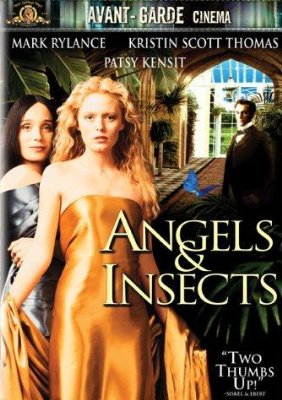
ANGELS AND INSECTS
UK/US, 1995, 117 minutes, Colour.
Mark Rylance, Kristen Scott Thomas, Patsy Kensit, Jeremy Brett, Douglas Henshell, Anna Massey.
Directed by Philip Haas.
Based on a novella by A.S.Byatt, `Eugenia Morpho' (and, according to critics, close to the original and incorporating most of the speeches, this is a most stimulating film. The setting is Victorian England, 1860, on a country estate where all is beautiful on the surface (using the image of butterflies) but there is ugly reality below the surface. A poor natural scientist (Mark Rylance) comes to visit his patron and to write of his Amazonian expeditions, collaborating with a poor relative-governess, Kristin Scott Thomas. Unexpectedly, he woos and marries the daughter of the house, Patsy Kensit.
As a period drama, the film looks authentic and beautiful. As a reflection of the Victorian era and the delight, after
Darwin, in the sciences, discoveries and publishing, it is always interesting. As a philosophical reflection on human
nature and the world, it gives food for thought. As a human drama, it highlights secrets and lies and their consequent pain. This very British film was co-written and directed by an American, Philip Haas (The Music of Chance). Kristin Scott Thomas starred for Philip Haas in Up at the Villa. Absorbing.
1. A period re-creation of 1860s, the atmosphere of the 19th century in the United Kingdom, the early Victorian era? Audience expectations of drama, issues?
2. The work of A.S. Byatt and adaptation to the screen? The literary aspects of the film, the speeches and discourses, the arguments and discussions?
3. The opening with the Amazon, its evocative suggestion of primitive culture, the behaviour of the native peoples, the passionate singing and dancing? William Adamson in this context? The transition to the English house, the vast grounds? The transition from tribal music to classical score?
4. The title and its references? Butterflies and ants? Natural history? Entomology? The people as angels and the parallels and differences between the insects and the people? Beauty on the surface, clothes? The males and their peacock style, the females and the attraction, the lures? The issues of touching the insects and their delicacy, hounding the insects and seeing them as pests and plague?
5. The film as the story of Will Adamson, a 19th century scientist and explorer, the suggestions during the credits of his ten years in the Amazon? His poverty, shipwreck and losing all his documentation, his dependence on Sir Harold, the nature of 19th century patronage, the laboratories, classifying the insects, the possibility for research? His relationship with the children, their rambles and explaining nature to them? The support of Miss Crompton? The leading up to the experimentation with observing the ants and the possibility of writing and publishing the books?
6. The Alabaster family - the significant name? Sir Henry, the patriarch, his relationship with his wife, daughters, criticism of Edgar? His own research, welcoming Adamson into the household, willing to give him patronage? His own development in thought, his comments about moving from a literal interpretation of Genesis to the era of Darwin? His attacking Edgar for his ignorance? His own failed book? His daughters, wanting them married, wanting the oldest daughter married first? The social status, wealth? The opening dance, the elitism and snobbery? His wife and her continued eating, her place in the household, her death?
7. The focus on Eugenia: her name, Adamson calling the butterfly after her? At the opening of the film, her fiance committing suicide, her depression? Introduced to Will, at the dance, her attraction, running away, Edgar's criticism? Her fascination with Will, her moods, the dresses, the butterflies, the moths all over her, her being touched, the parallel with the butterflies? Will's affection for her, the courtship, her consent, the marriage? The sexual relationship and its passion? Her pregnancies, her relationship with the children, their place in the family? Her continuing her wealthy life, hunting etc? Will discovering her with Edgar, her telling the truth about the relationship since they were children, her powerlessness, her decisions, the suicide of her fiance and his note? Her future alone? The children as Edgar's rather than Will's?
8. The portrait of Edgar, ignorant, arrogant, his scenes at the ball, at the table, his father's rebuking him? His continual disdain of Will, condemning him as poor and as of a lower class? His taunts about class and blood? Fighting with Will? Will standing as a man of peace and not ensnared by Edgar's insinuations? The relationship with Eugenia, the end?
9. The next sister, her husband, their friendship, pleasant, wanting children like Eugenia and Will, the card games and the pastimes in the household?
10. Miss Crompton, poor, the governess, being charitably given work, her presence and appearance, her place in the household? Her interest in Will, talking and sharing ideas with him, the interest in science, her ability to draw, her own investigations and research? The suggestion about the books? Her own book which was a secret? The experience with the ants, the experimentation, the observations and records? Her knowing the truth about Eugenia and Edgar, admitting it to Will? His dependence on her for a listening ear, his love for her, her devoting the money from the book to a passage to the Amazon? Her strength and determination to go to the Amazon and explore?
11. The sketch of the children, the household, the nannies, the governesses, the pastimes, the rambles, the games, classes? Their participating in the experiments?
12. A picture of the 19th century and extraordinary changes in ideas, from literal interpretation of Scripture to Darwinian evolution? The development of science, natural history? The philosophical implications of the discussions? The religious implications, especially about the presence and existence of God? Morality, surface respectability, immorality underneath the surface? The mores of the Victorian era and the critique of these?